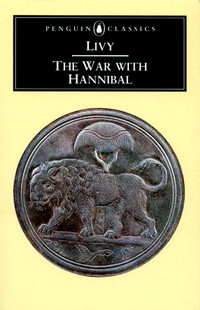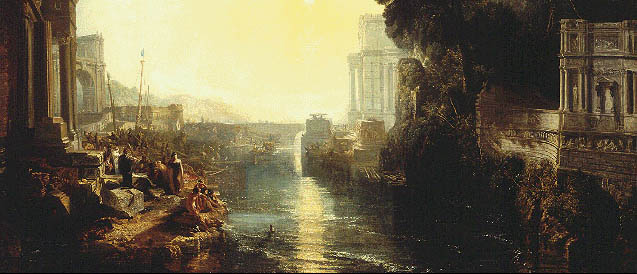Uncle Livy
/Uncle Livy
| From kingdom to republic to empire, the ancient Romans have transfixed the imagination of the ages, inspiring bestselling novels, plays, poems, movies, and TV productions (not to mention several nations and more than a few dictatorships). Throughout 2009, Steve Donoghue will trace their pomp and circumstance in "A Year with the Romans." |  |
I hate that guy from Cadiz. Anyone who’s ever read about the Augustan Roman historian Titus Livius, our dear avuncular Livy, will know the man: he’s alleged to have venerated the historian so much that he walked all the way from Spain to Italy just to look at him, then turned around and walked home without so much as getting an autograph. It’s the most persistent Livy story, sprouting up after each mowing like crab-grass ever since it was first written by Quintilian or somesuch gasbag. Livy shows every sign of having had a healthy opinion of himself, so he probably liked the Cadiz story (if he ever heard it), but it does more harm than a little anecdote should – it makes Livy into a monument, something so vast and formidable and inhuman that you’re better off just looking and then moving on, like you were gawking at the Great Wall of China. There are obstacles enough to a popular enjoyment of ancient historians these days, without that guy from Cadiz telling all his buddies back home that just a quick gander at this Livy person was good enough for him.“He is always great,” renowned classical compiler John Lempriere tells us, “his style is clear and intelligible, labored without affectation, diffusive without tediousness, and argumentative without pedantry.” All of which is true enough and good for Livy, but Lempriere’s subscribers were far more likely to know Latin than the elusive common reader of today, so the style that’s always clear must now contend with translators. This is a tricky business even under the best of circumstances, and the sharpest warning concerning Livy’s circumstances comes from his greatest 20th century English language translator, Aubrey de Selincourt:
Much nonsense has been talked about the art of translation. Translators have claimed to produce the ‘spirit’ of the original: i.e. the subtlest inmost essence of his style. It cannot be done: that subtlest essence lies within the words themselves; change the words and it, too, is inevitably changed. Other translators have professed to write as they suppose their original would have written, had he been their contemporary and used their language. This is absurd: if Livy, say, were alive today and an Englishman, every influence which went to make his style – and there are a million such for every writer – would be utterly different from what it was. No: style is too serious a thing to monkey with, or to make pretences about. To try to imitate another man’s style, even the style of the man next door, makes false writing; to try to imitate the style of a foreign author who’s been dead two thousand years is plain silly.
Such a warning becomes more important the further removed from the present your translated text is; as de Selincourt makes clear, when you’re translating someone like Livy, you’re translating not just words but an entire culture. And as if this task weren’t daunting enough, there’s also a question of ideology, of – pardon the ominous word – methodology. Because it isn’t just culture and language that have changed in the two thousand years since Livy spent his lifetime writing the history of Rome – it’s our very concept of what history is, and what constitutes the writing of it.Like most problems confronting the modern world, this one has a German origin.
 |
The 19th century saw the systematization and proliferation of a methodology championed by a cadre of historians led by Barthold Niebuhr. Scholars such as Mommsen, Hesselbarth, Breska, Luterbacher, Soltau, Ihne, and Ranke began to pursue a single-minded desire to “describe what actually happened,” to carve away the accretion of unattributed folklore and leave only the rump roast of factual verification in the historical record. This school of historical interpretation was perfectly suited to the increasingly scientific time in which it flowered; suddenly, bills of lading, rates of coinage debasement, baskets of old sales receipts – things Livy literally wouldn’t have crossed the street to see – became not only the point but the purpose of the discipline. By the dawn of the 20th century, a British adherent of this methodology, J. Wright Duff, could be quite blunt: |
Nothing is simpler than to make out an apparently damaging case against Livy. There are grave defects in method and knowledge. That he was often content with second-hand information when first-hand sources were available, that he gleaned the harvest of annalists rather than grubbed among dusty archives himself, that he was slack in verification, indifferent to topography within his reach – these and other sins of omission may be fairly laid to his charge. If one thinks of him beside the historian of The Decline and Fall, Livy notably lacks Gibbon’s power of sifting evidence or tracing a causal connection …
And while Duff then goes on to make an equally strong case in Livy’s favor, he does so by shifting his categories, hinting that it might be easier for all of us if we just considered Livy some sort of epic poet instead of a real historian – because poets have artistic license, whereas real historians, particularly after Niebuhr, have court affidavits.(Although even Wright’s “nothing is simpler” point can be contested, most notably by the great classicist Gilbert Highet:
Livy is sonorous and dignified in his narration of complex strategic events, breaks into short, irregular sentences to relate battles, sieges, conflicts, diplomatic struggles, or disasters, flames into fiery rhetoric when a hero or villain delivers one of those character-revealing and emotionally moving orations with which he punctuates his action: as a result, he is far more individual, far less expected and monotonous than Gibbon. )
This fetishization of dates and facts and primary sources dealt a devastating body-blow to the Livy model of history (really the Herodotus model, since he’s the one who started it). It was no longer professional to pick and choose which facts you presented to your readers, no longer tenable to shape those facts toward editorial rather than narrative ends, and no longer acceptable to make stuff up. The hegemony of these new strictures is currently absolute: the mere suggestion that what Livy spent his entire life writing constitutes good history will be met only with condescending smiles from modern professional historians. That Livy was himself a professional historian is one of the only facts we can comfortably infer about him – he spent his adulthood working on his enormous Ab Urbe Condita, either in the heart of Rome with its extensive public and private libraries, or else ensconced in his native Patavium, probably spending the bulk of his time researching and note-taking, only buckling down to write a new volume when there’d been a conspicuous pause since his last volume. The outward trappings are recognizable to any historian publishing today – and yet every single one of those historians looks upon that life’s work of Livy’s with politely restrained pity.
| But there is another way to write history, another way to conceive of history – Livy’s way, in which the events and people of the past are not actuarial tables but rather avatars of the present. This concept of history need not necessarily be less factually trustworthy than the German model; in the 35 “books” that remain of the 142 that comprised his From the Founding of the City, Livy weighs a broad array of written accounts while constructing his own, and reading his history leaves you with the unmistakable impression that this man knew his way around accounts and books and libraries. He tells us something of his own methodology: when he encounters multiple or conflicting versions of an event, he picks the one that seems right to him – not the one with the clearest audio transcription, but the one that his reading and experience incline him toward. | 
Romulus and Remus Given Shelter by Faustulus by Pietro Berrettini, 1640s |
Experience, and artistic mission: Livy’s purpose is always to bring the past alive, to infuse it with colors and smells and sounds. The historian Ronald Syme alludes to “assiduous industry in quiet Patavium” and notes that such idyllic abstraction could get more complicated as Livy brought his story closer to the turbulent present of his own day. An anecdote hints that he was on friendly terms with Rome’s new emperor Augustus despite being vaguely sympathetic to the emperor’s former rival Pompey the Great, and if it’s true, the reasons aren’t hard to guess: despite finding fault with various generals and nobles in his accounts as events warrant, Livy is ultimately patriotic. And, in a further detail likely to endear him to the priggish new lord of the Roman world, he is ultimately moralistic as well. The selfless character of the great Roman historical figures is celebrated tirelessly in Ab Urbe Condita, a celebration that concludes with the triumph of Augustus, his family, and his vision of a new world. And since it’s Uncle Livy doing the celebrating, we smile indulgently when he scolds our decadent modern ways. We don’t know if Livy was a paid client of Augustus’ propaganda minister Maecenas, but it would certainly have been money well spent.Whether Livy was on the imperial payroll or simply coincidentally aligned with it, the fact that he created a towering masterpiece was recognized in his own day, although not always favorably: Caligula wanted to ban his works as bloated and boring; Domitian executed a man in part because the man always carried around a collection of speeches by Livy’s kings on the evils of tyranny. All subsequent historians lean on him to varying degrees (none more reluctantly than the austere proto-Niebuhr Tacitus), and all later ages have had to contend with the enormity of his achievement. Boccaccio translated him, and the Spanish version by Ayala was highly influential; Schofferlin and Wittig and later Carbach translated him into German in the opening years of the 16th century, and Philomen Holland was the first to translate him into English, in 1600. English translations, annotations, and commentaries have flowed freely ever since. The great majority of these translations have been less than successful, stymied by the precise problems described by de Selincourt. Livy handles Latin with the ear, the daring, and the total control of an orchestra conductor; translators try to keep pace with him, but it isn’t easy.

Dido Building Carthage, or the Rise of the Carthaginian Empire by JMW Turner, 1815
The central problem in translating Latin used by a rhetorical master such as Cicero or Livy is the simple fact that they are displaying their virtuosity in a medium almost totally alien to English. Latin is a heavily inflected language in which individual words contain far more encoded information about their nature and function. Look at the English sentence “the poet drank wine” – to a native English speaker, it seems straightforward enough, and perhaps a native speaker of Latin would find it so as well. But if you then look at the (inevitable?) next English sentence “Wine made the poet drunk,” you begin to see the problems. In both sentences, for instance, the word ‘poet’ looks exactly the same, even though its function is radically different – performing the action in the first and receiving the action in the second. Likewise the wine, which is a passive thing in the first sentence but active in the second, despite the word looking exactly the same in both cases. The lines share only one thing in common, but it’s key: they both bear the reader forward, like a javelin-shot; who does the poet dally with? what does the Romanian do? The lines read left to right not just with metrical nicety but also with dramatic momentum.This isn’t necessary in Latin, since each word is declined and conjugated to give the reader explicit instructions – or at least strong clues – as to what it’s doing in the sentence. And because the individual words are so much more self-contained, as it were, since they can bob around in the sentence far more than their counterparts in English, Latin prose stylists are free to concentrate their cleverness and creativity on other aspects of expression. Word order might still have some importance, but it’s an importance that can be manipulated in a master’s hands – how exquisite a wait will there be, between the verb and the noun doing the verb? How much ambiguity can the writer work into the delay, and what play can be made on the words in between?A visual analogy might help: picture written English as a flock of geese in flight, constant, urgent, overlapping calls, with the point-caller often shifting to the back so another can come forward – but always forming an arrowhead, always pointing somewhere. Alternately, picture written Latin as a series of pebbles dropped in a pond, with the ripples spreading outward, lapping and latticing with each other, circling outward from the dropped pebble but still defined by it.Faced with such radically different linguistic worlds, translators of Livy have to improvise – not wanting to produce gibberish, they have no choice but to produce paraphrases. This can no doubt be frustrating, especially for modern academic classicists whose accuracy-over-all compulsions prompt them to hew as close to Livy’s actual words as possible. Take a scene from the climax of Livy’s dramatic account of Rome’s epic Second Punic War: the Senate is debating whether or not to take the war directly to Carthage in the hopes of ending it at last. The author of this scheme is the dashing young hero of the hour, Publius Cornelius Scipio, and he’s meeting with steady opposition from the white-haired old military legend Quintus Fabius Maximus, here in the 2006 translation J. C. Yardley did for Oxford University Press:
Are you then going to be stronger on your own in Africa, or here with your army joined to that of your colleague? Does not the recent example of Claudius and Livius also serve to illustrate how important a difference that makes? And what, I ask you, is going to make Hannibal stronger in terms of arms and personnel? Being in a remote corner of Bruttian territory where he has long been vainly appealing for reinforcements from home, or having Carthage close by with all of Africa allied to her? What sort of idea is this, to want to decide the issue where your forces are halved, and your enemy’s much greater, instead of where your two armies are to be fighting against one, and one worn down by so many battles and such long and arduous service?
At first glance, it’s difficult to see how anything in that passage would cause some guy from Cadiz to put on his hiking boots. Looking at de Selincourt’s 1960 Penguin Classics translation offers a better picture:
Say then, will you be stronger alone in Africa, or here in Italy supported by your colleague’s army? Is not the recent example of the consuls Nero and Livius sufficient proof of the difference? And as for Hannibal, in which circumstance is he likely to be the stronger, when he is boxed up in a corner of Bruttium, still vainly asking for reinforcements from home, or when he is close to Carthage with all Africa at his back? It is surely an odd sort of strategy to prefer to fight when your own numbers are cut by half and those of the enemy greatly increased, rather than when two armies of your own have a chance of dealing with a single enemy force already exhausted by the innumerable struggles of a long and exacting campaign.
That’s closer to being good reading – close enough, anyway, to give even a non-Latinate reader some tantalizing hints of what the tangled and interconnected original is like. Of how good the original is, despite the fact that neither Scipio nor Quintus Fabius Maximus ever actually said those words – Livy is more famous (or infamous, if you ask Domitian) for his invented speeches than for any other stylistic flourish, and they handily symbolize everything the German methodology abhors: invented speeches, no matter how dramatic, can have no place in the work of a real historian. Where the record is silent, the historian must be silent as well, or else risk being called a poet.But no less a poet than Dante referred to Livy as infallible, and it’s possible the discipline is the poorer for having scorned the way in which that term may well be true. In the meantime, we’re still reading Livy (or trying) today, 2000 years after his death in the reign of Augustus’ successor Tiberius - and there’s a truth in that no methodology can touch.___Steve Donoghue is a writer and reader living in Boston with his dogs. He’s recently reviewed books for The Columbia Journal of American Studies, Historical Novel Review Online, and The Quarterly Conversation. He hosts the literary blog Stevereads and is the Managing Editor of Open Letters Monthly.






